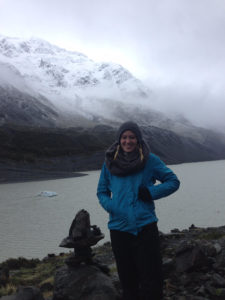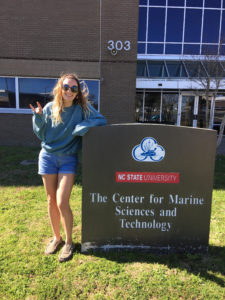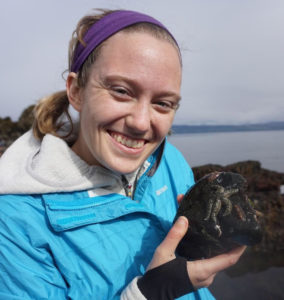Adrian Teegarden ‘19 pushes herself beyond her comfort zone when it comes to exploring her interests in marine science fieldwork and art. Since she has started the Park Scholarships program, Teegarden has discovered a myriad of opportunities to combine these seemingly unrelated fields.
 First, she studied abroad in New Zealand the summer after her freshman year where she learned about sustainability and Kiwi culture. While there, Teegarden was inspired by the native Maori concept of “kaitiakitanga,” which can be translated as “stewardship over the environment and people.”
First, she studied abroad in New Zealand the summer after her freshman year where she learned about sustainability and Kiwi culture. While there, Teegarden was inspired by the native Maori concept of “kaitiakitanga,” which can be translated as “stewardship over the environment and people.”
“Since we were students studying how to protect the environment, we had the rare opportunity to learn and live with a Maori couple. One day, I remember waking up around 4:30 a.m. with friends to go for a chilly run before our scheduled activities. After the run, we decided to go kayaking on a mirrored lake just as the sun started to rise. Being completely, silently immersed in nature after learning about the powerful Maori virtues of advocating and protecting the environment was inspiring.”
Teegarden participated in the Semester at CMAST (Center for Marine and Science Technology) in Spring 2017 in Morehead City, NC. She took part in dolphin stranding calls, necropsies, worked on the re-articulation of a sea turtle skeleton, went to fish houses, and attended community shrimp forums. After CMAST, Teegarden worked with the North Carolina Wildlife Federation, advocating for the protection of the forage fish species Atlantic menhaden.
 She received an internship this summer through the Ernest F. Hollings Scholarship with the National Oceanic and Atmospheric Administration (NOAA) Kasitsna Bay Lab in Homer, Alaska, consisting of fieldwork, data analysis, and data representation using art. She says, “This experience allowed me to get basic training in the marine science field while forming relationships with some inspiring female scientist mentors in the crazy beautiful scenery of Alaska…I could not believe that I was being paid to be in such a stunning environment, and that I had the opportunity to study and work to protect these beautiful and critically important ecosystems.”
She received an internship this summer through the Ernest F. Hollings Scholarship with the National Oceanic and Atmospheric Administration (NOAA) Kasitsna Bay Lab in Homer, Alaska, consisting of fieldwork, data analysis, and data representation using art. She says, “This experience allowed me to get basic training in the marine science field while forming relationships with some inspiring female scientist mentors in the crazy beautiful scenery of Alaska…I could not believe that I was being paid to be in such a stunning environment, and that I had the opportunity to study and work to protect these beautiful and critically important ecosystems.”
“My last day out on the field for the summer, I started crying because I was so grateful for the people I worked with all summer and for the incredible environment in which I was existing. At that point, all of the marine techs started hugging me and telling me about the internships they had years ago in Homer, Alaska that changed their lives too.”
 She says her Park Faculty Mentor, Dr. George Hess, helped her recognize that she seems to learn the most about herself when she participates in hands-on, science training programs. She notes, “Being able to talk to marine science professionals about their paths and to get a taste for the many different projects they work on has been invaluable.”
She says her Park Faculty Mentor, Dr. George Hess, helped her recognize that she seems to learn the most about herself when she participates in hands-on, science training programs. She notes, “Being able to talk to marine science professionals about their paths and to get a taste for the many different projects they work on has been invaluable.”
Teegarden is looking forward to finishing her marine science degree in the Galapagos Islands in Spring 2019.
story by Lauren Caddick ’14
posted 2018.11.01